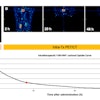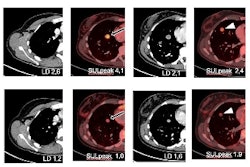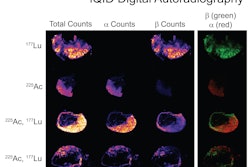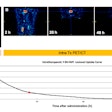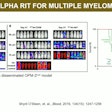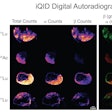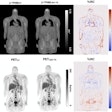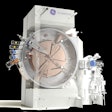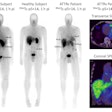Fibroblast activation protein inhibitor (FAPI) PET/CT could be suitable for systemic staging of newly diagnosed breast cancer, suggest findings presented June 11 at the Society of Nuclear Medicine and Molecular Imaging (SNMMI) annual meeting.
In her talk, Zhixin Hao, MD, from Peking Union Medical College Hospital in Beijing, China, presented findings from a comparative study demonstrating that FAPI PET/CT is more accurate than F-18 FDG PET/CT in systemic staging of new breast cancers, reporting that FAPI PET/CT restaged nearly 20% of women.
“This study is significant as it has the potential to advance personalized treatment strategies for breast cancer patients,” Hao said in a statement released by the society. “FAPI PET/CT for the initial staging of breast cancer has the potential to reduce unnecessary treatments and improve patient outcomes.”
F-18 FDG PET/CT is commonly used in breast cancer staging. However, Hao and colleagues noted this modality’s limitations, including false-positive cases in inflammatory breast lesions and reduced sensitivity in specific breast cancer subtypes.
Previous small-sample retrospective studies suggest that Ga-68 FAPI may be a better option than F-18 FDG PET/CT. They highlighted FAPI’s high sensitivity in finding primary tumors and metastases among breast cancer patients. Hao, however, noted a lack of data showing FAPI PET/CT’s efficacy in larger studies.
She and co-authors assessed FAPI PET/CT for systemic staging on newly diagnosed breast cancer in, comparing the results to those of F-18 FDG PET/CT. The study included 121 women, all of whom underwent F-18 FDG imaging. Additionally, 53 of the women were imaged with Ga-68 FAPI-04 PET/CT and the remaining 68 were imaged with A1 F-18 FAPI-04 PET/CT.
 Clinical stage changed by FAPI PET/CT categorized by F-18 FDG PET/CT in newly diagnosed breast cancer.SNMMI
Clinical stage changed by FAPI PET/CT categorized by F-18 FDG PET/CT in newly diagnosed breast cancer.SNMMI
The researchers analyzed the data and recorded lesions as positives if their uptake exceeded that of the adjacent background tissue. They also determined tumor, node, and metastasis (TNM) clinical staging from F-18 FDG and FAPI PET/CT, going by the American Joint Committee on Cancer Staging Manual.
FAPI PET/CT led to 19.8% of the women being restaged compared to conventional clinical TNM staging. Hao said that management plans were optimized in six women due to the additional detection of bone lesions and internal mammary lymph nodes.
Also, FAPI PET/CT upstaged 21.7% of stage IIA patients initially staged by F-18 FDG PET/CT. Hao said that women with stage IIA breast cancer should be considered for systemic staging with FAPI PET/CT at the time of initial diagnosis.
She concluded that the results point to the FAPI PET/CT radiotracer as being an effective and beneficial tool for clinical practice.
Click here for our full SNMMI coverage.


